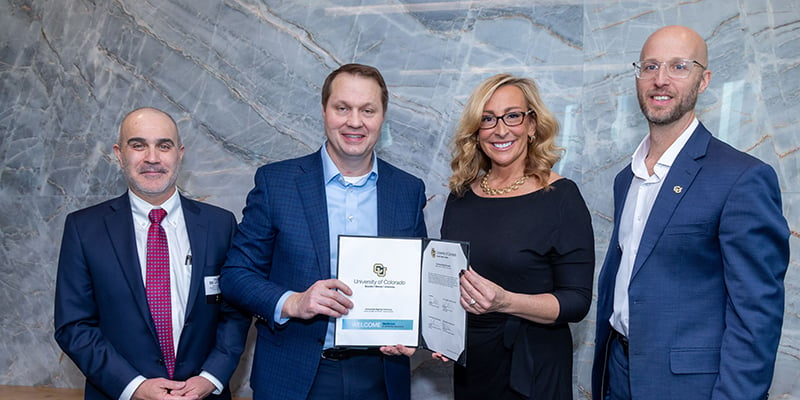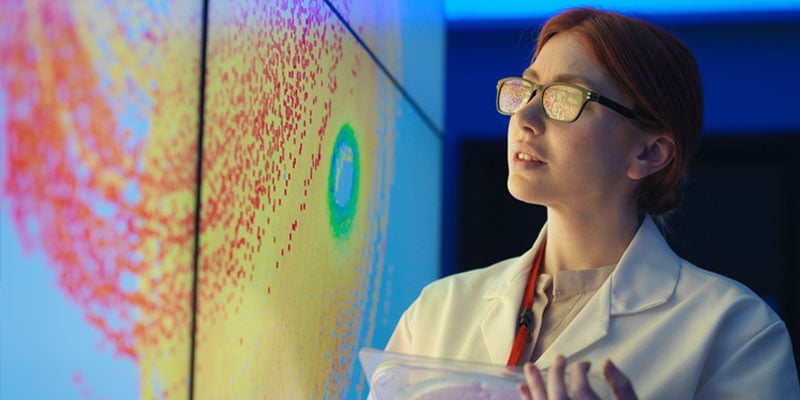Editor’s note: “Our COVID-19 Fighters” is an occasional series highlighting the ways the CU Anschutz Medical Campus community is helping patients and the wider community in the fight against the pandemic. We welcome your story ideas; please share them here.
While the COVID-19 pandemic made its invisible march across the globe, lights glowed around the clock inside the Colorado Center for Personalized Medicine (CCPM) Biobank Laboratory on the University of Colorado Anschutz Medical Campus.
Over eight days in mid-March, the team in the lab, directed by Kristy Crooks, PhD, and Stephen Wicks, PhD, developed a molecular test to determine whether a person was infected with the coronavirus causing COVID-19.
“We were fully validated and ready — it took a huge lift,” Crooks said. “We worked really hard to do the experiments to prove to the FDA (the Food and Drug Administration allows this testing through its Emergency Use Authorization for COVID-19 testing) that we can do this responsibly.”
Take up the slack
Through early this week, the CCPM Biobank’s diagnostic test had been used to test about 300 patient samples. It is one of several COVID-19 tests being used in clinics and hospitals on campus. “These different tests across campus all use different suppliers,” Crooks said. “That’s great, because if any one line of testing goes down another line can take up the slack.”
‘The technical sensitivity of these assays
is excellent – if the viral RNA is there,
the assay will be positive.’
– Kristy Crooks
Disruptions to testing can occur if an instrument breaks or if there is a staffing shortage. The Biobank’s testing capacity helps ensure that all tests ordered on campus can be given in a timely fashion, Crooks said.
The lab is set up for high-throughput testing, she noted. The facility’s robotic instruments and bar-code readers allow it to read hundreds of samples at a time. As such, the lab can process up to 1,000 tests a day. The turnaround time for a result is under 24 hours.
‘Sensitivity of assays is excellent’
With regard to accuracy, Crooks said the Biobank’s assay will detect whether viral RNA is present in any appreciable level. The lab has validated samples taken from the nasopharyngeal (NP) swabs – upper respiratory tract – as well as from the lower respiratory tract, where the virus also appears in patients, as it shows evidence of moving deeper into the tract.
“The technical sensitivity of these assays is excellent – if the viral RNA is there, the assay will be positive,” she said. “The clinical sensitivity is lower, but that’s because the sample type doesn’t always have the virus in it, even if the patient does have the virus elsewhere in their system. So, timing of sampling is important, and recent evidence indicates the test is most accurate for NP swab samples during the first several days of the acute phase.”
The Biobank is at the heart of the CCPM, a multi-institutional collaboration between the University of Colorado, UCHealth, CU Medicine and Children’s Hospital Colorado. The CCPM began collecting participant electronic health record data and blood samples for the Biobank in 2015 and has enrolled over 100,000 participants to date.
Its work is on the cutting edge of improving the understanding of how genetic differences impact people’s health and the development and management of disease.
Ready for surge
So, the chance to help during the public health crisis by working round the clock to develop a diagnostic platform – a process that typically takes a few weeks – was embraced by the CCPM Biobank team. They stand tall as COVID-19 fighters: Kristy Crooks, lab director; Stephen Wicks, regulatory compliance director and Clinical Laboratory Improvement Amendments (CLIA) Biobank technical supervisor; and Teresa Frye, laboratory manager; and laboratory technicians Alanna Roff, Adrian Stewart and Olivia Nohrenhold.
By mid-April, a surge in requests for test processing hadn’t hit the Biobank, Crooks said, but “we expect to be needed on a daily basis in the next week or two.”



